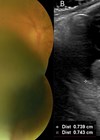The authors sought to investigate factors associated with Quality Of Life (QOL) after initial diagnosis of uveal melanoma (UM) using prospectively collected data between September 2011-May 2016. They included 201 participants referred for radiotherapy after UM diagnosis by an ophthalmic oncologist. Participants were then asked to complete two questionnaires relating to quality of life (European Organization for Research and Treatment of Cancer (EORTC) Quality of Life Questionnaire) and for symptoms (Ophthalmic Oncology module, QLQ-OPT30). After collection of participant demographic, ophthalmic and tumour-related parameters, the authors performed multivariable stepwise analysis to investigate associations between independent factors and QOL scores. Participant characteristics included: median age of 61 years, 94.5% were white, median visual acuity in melanoma eye was 20/30 compared to non-melanoma eye at 20/25; and the majority of tumours were stage 2. There was good internal consistency amongst questionnaire answers with the commonest worry for participants being disease recurrence. Common ophthalmic symptoms reported in this study included vision impairment (81%) and ocular irritation (66%). This study offers a snapshot into QOL effects at UM diagnosis on an individual and expands on associated symptoms which may be attributable to QOL changes. However, the cohort was limited to those after diagnosis and indicated for radiotherapy. This brings to light questions on how the QOL of those after radiotherapy is affected as well as those not suited for treatment. The authors report that strategies to mitigate QOL concerns is under researched and these findings may help raise clinical awareness as well as prompt development of strategies to improve QOL.
Quality of life concerns after uveal melanoma diagnosis
Reviewed by Annes Ahmeidat
Quality of life concerns in patients with uveal melanoma after initial diagnosis.
CONTRIBUTOR
Annes Ahmeidat
MBChB, BSc, Ninewells Hospital and Medical School, Dundee, UK.
View Full Profile




